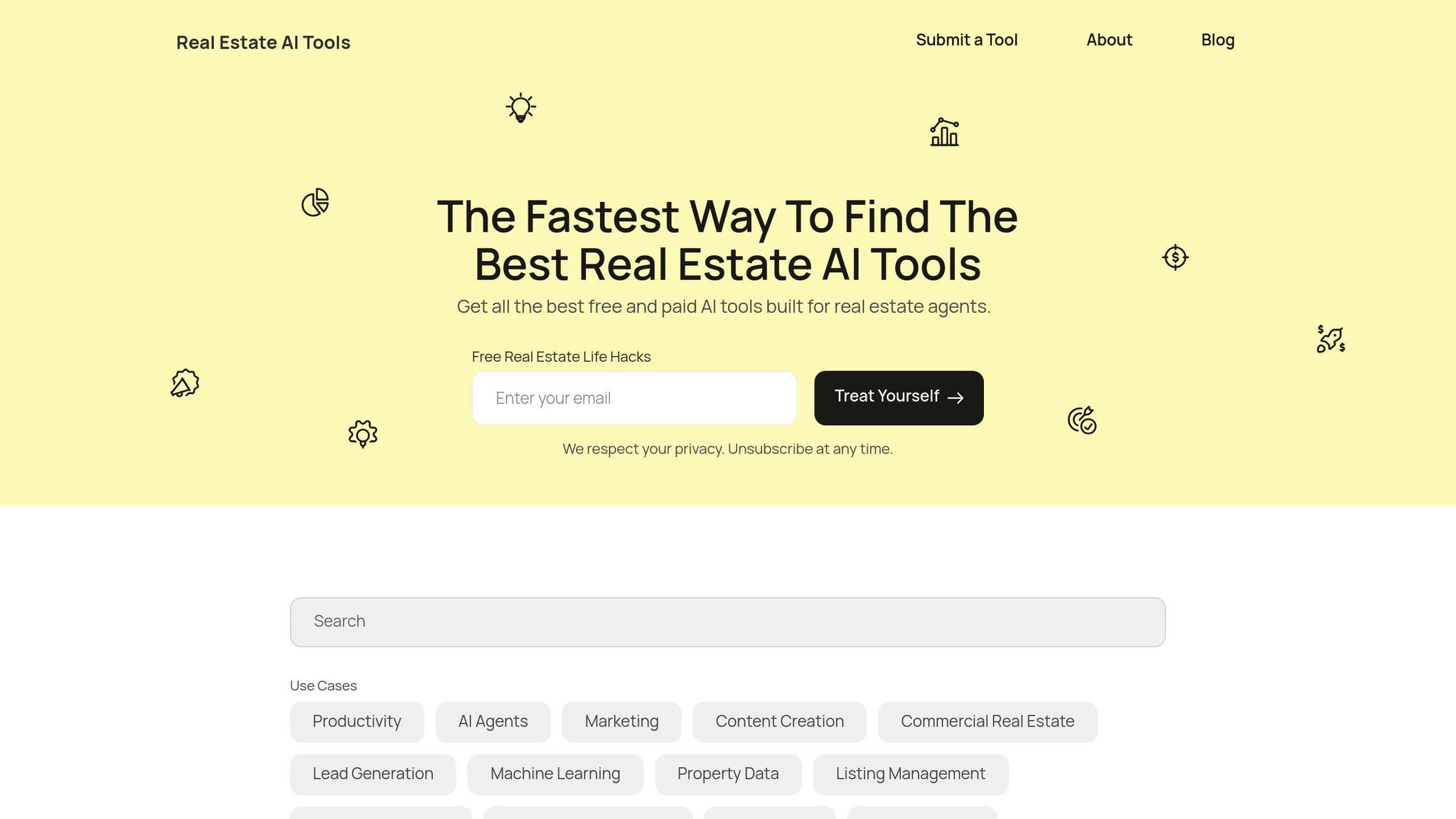AI is transforming real estate by helping agents understand buyer preferences and match properties more effectively. Here's how:
- Efficient Property Matching: AI analyzes buyer behavior (e.g., search filters, time spent on listings) to recommend suitable homes.
- Market Predictions: Tools forecast trends and property values using historical and economic data.
- Streamlined Workflows: AI automates tasks like lead responses, scheduling, and property valuations, freeing agents to focus on clients.
- Personalized Recommendations: By tracking buyer actions, AI uncovers both stated and unstated preferences.
For agents, adopting AI tools like Zillow Premier Agent AI or RealScout can enhance decision-making, improve client satisfaction, and close deals faster. Start with clean, accurate data and integrate AI into daily tasks for the best results.
AI Powered Real Estate Analysis Tools
How AI Helps Agents Understand Buyer Preferences
AI has changed the game for real estate agents by making it easier to analyze and understand buyer preferences. Through advanced data processing and pattern recognition, these tools offer insights that help agents make smarter decisions and better assist their clients.
Matching Buyers with the Right Properties
AI platforms dig into user behavior to build detailed buyer profiles. They examine factors like:
- Property viewing habits
- Changes in search filters
- Time spent exploring specific features
- Interaction with virtual tours
- Property traits that catch attention
This data reveals what buyers truly care about, often surfacing preferences they haven’t directly communicated.
Using Market Data to Predict Trends
AI tools process historical data, market trends, and economic indicators to forecast buyer behavior and property values. This helps agents spot new opportunities and guide clients toward properties that fit their needs today and align with future market conditions.
On top of that, AI analyzes individual buyer patterns to provide even more tailored recommendations.
Identifying Patterns in Buyer Behavior
AI systems monitor buyer activity over time, focusing on three main areas:
- Search history and property views
- Engagement metrics, like time spent on listings
- Communication habits and stated preferences
By blending these behavioral insights with market data, agents can recommend properties that match both spoken and unspoken preferences. This makes the property-matching process smoother and more precise, boosting client satisfaction and increasing the chances of closing deals.
AI doesn’t just listen to what buyers say - it pays attention to what they do. This deeper understanding helps agents meet buyer needs more effectively while streamlining their workflow.
AI Tools That Help Real Estate Agents
AI is transforming how real estate agents understand and respond to buyer preferences. Specialized directories like AI Tools For Real Estate Agents make it easy to find platforms tailored to specific needs.
AI Tools For Real Estate Agents

This directory highlights tools such as Dialzara, Epique, and SEObot. These platforms enhance real estate operations by improving productivity, automating marketing efforts, and creating content that helps agents connect with clients on a deeper level.
Key Features of AI Tools for Real Estate
AI tools bring powerful features to the table that streamline buyer preference analysis and improve decision-making:
- Advanced Analytics: Predict market trends and uncover new buyer patterns.
- Smart Marketing: Build tailored campaigns based on buyer activities and interests.
- Automated Lead Response: Offer timely follow-ups using real-time data.
- Property Matching: Leverage behavioral insights to recommend suitable listings.
RealScout and Homebot are great examples of these features in action. RealScout refines sales strategies by analyzing client behavior, while Homebot's "Likelihood to Sell Score" predicts which homeowners might move within the next year.
Example: Using AI to Close a Deal
AI tools also play a direct role in closing deals.
Zillow Premier Agent AI simplifies the buying process by tracking buyer interactions and automating lead management. This ensures clients are shown properties that align with their preferences.
HouseCanary adds another layer of value by using detailed market analysis to provide accurate property valuations. This helps agents make informed recommendations that resonate with potential buyers.
sbb-itb-db182b0
Tips for Using AI in Real Estate
Once you've chosen the right AI tools, the next step is making sure they fit smoothly into your daily operations.
Keeping Data Accurate and Complete
To get reliable insights from AI, your data needs to be up-to-date and accurate. Here's how to stay on top of it:
- Regular Updates: Keep listings and buyer information current.
- Data Validation: Use AI tools to verify the accuracy of your data.
- Detailed Records: Maintain thorough property and transaction details.
- Standardized Formats: Ensure data entry follows consistent formatting.
Alma from Deal Machine shows how clean, organized data can improve AI's ability to match properties effectively.
Adding AI Tools to Your Workflow
Platforms like LocalizeOS and Zillow Showcase are designed to make property recommendations easier. Here's a step-by-step guide to integrating them into your workflow:
| Phase | Action | Expected Outcome |
|---|---|---|
| Initial Setup | Input client data into the AI | Better insights into buyer preferences |
| Daily Tasks | Use AI for matching properties | Faster and more precise targeting |
| Weekly Review | Analyze AI-generated insights | Smarter strategy adjustments |
| Monthly Check | Evaluate AI's performance | Streamlined and improved processes |
Start with one tool and get comfortable before adding more. For example, Sidekick users often begin with basic communication features and gradually explore predictive analytics.
Conclusion: AI's Role in the Future of Real Estate
Key Points to Keep in Mind
AI is transforming the way real estate professionals understand and serve their clients. By analyzing large sets of data, AI enables agents to make smarter decisions about buyer preferences and property recommendations. Tools such as Zillow Premier Agent AI and RealScout showcase how technology can sift through property data, market trends, and buyer behavior to provide actionable insights.
These tools have enhanced agents' ability to align properties with what buyers are searching for, taking into account factors like search patterns and market dynamics. By handling multiple data streams at once, AI offers a well-rounded view of both client needs and market opportunities.
What Lies Ahead for Real Estate
Using AI tools is becoming a must for staying competitive in today’s real estate landscape. To make the most of AI in this field:
- Start with basic property-matching tools before diving into more advanced features.
- Ensure the data you input is accurate and high-quality for better results.
- Use AI-driven insights as a complement to, not a replacement for, your professional judgment.
AI-powered systems are poised to play a bigger role in understanding buyer needs and uncovering market opportunities. By integrating these technologies, agents can boost client satisfaction, close deals more efficiently, and maintain their edge in a fast-changing market.
For those ready to embrace this shift, platforms like AI Tools For Real Estate Agents offer helpful resources for finding and adopting the latest AI technologies. Success in the future will come from blending AI's analytical abilities with human expertise to deliver outstanding service.
FAQs
As AI becomes integral to real estate operations, here’s a look at common questions about its role in analyzing buyer preferences.
What type of AI is most used in real estate?
Machine learning is the go-to AI technology in real estate. It focuses on spotting patterns in data to predict outcomes and streamline decision-making. Platforms like Zillow Premier Agent AI and RealScout rely on machine learning to analyze property data and buyer behavior.
These tools are particularly effective for:
- Predicting market trends
- Offering personalized property suggestions
- Recognizing patterns in buyer actions
How does AI determine buyer preferences?
AI sifts through historical data, user behaviors, market trends, and property details to predict what buyers are looking for. It considers factors like:
- Previous purchase history
- Property viewing patterns
- Local market dynamics
- Desired features and locations
"AI algorithms can quickly analyze vast amounts of data, including property details, market trends, and buyer preferences, to present potential buyers with tailored recommendations that match their needs." - BrightCall AI Blog
What obstacles come with AI-driven preference analysis?
Implementing AI tools in real estate isn't without its hurdles. Common challenges include:
- Data Quality: Accurate, up-to-date data is crucial for reliable predictions.
- System Integration: Merging AI tools with current platforms requires careful coordination.
- Training and Adoption: Staff need time to adapt to new workflows.
- Ethical Concerns: Ensuring unbiased and fair decision-making is critical.
Regular updates and monitoring are essential to keep these systems running effectively.
How can agents gauge AI performance?
Agents can track the success of AI tools using these key metrics:
| Metric | What It Measures |
|---|---|
| Match Rate | How well property recommendations align with buyer needs |
| Lead Conversion | The percentage of leads turned into sales |
| Time-to-Close | How quickly transactions are completed |
| Client Satisfaction | Feedback on AI-based property matching |
These indicators provide insights into how AI tools are influencing business results and improving client experiences.


